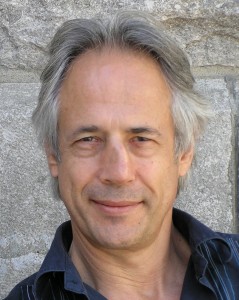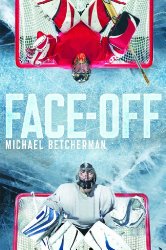Meet Young Adult Fiction Author Michael Betcherman
 Michael Betcherman is an award-winning author and screenwriter. He has numerous writing credits in both dramatic and documentary television, including several episodes of the popular CBC drama, Street Legal. He is also the author/creator of The Daughters of Freya and Suzanne, two groundbreaking online novels that were highly praised by numerous publications, including The Globe and Mail and The (U.K.) Guardian.
Michael Betcherman is an award-winning author and screenwriter. He has numerous writing credits in both dramatic and documentary television, including several episodes of the popular CBC drama, Street Legal. He is also the author/creator of The Daughters of Freya and Suzanne, two groundbreaking online novels that were highly praised by numerous publications, including The Globe and Mail and The (U.K.) Guardian.
Michael has written two young adult mystery novels, Breakaway and Face-Off, both published by Penguin Canada. Breakaway was short-listed for the John Spray Mystery Award.
Author Facebook page
Author Twitter account @MBetcherman
Tell us about your latest published book. Who do you think should read it? What are you most proud of?
My latest book is Face-Off, a Young Adult mystery published this February.
Here’s a brief synopsis:
 17 year-old Alex Petrovic came to Canada with his mother when he was an infant, after his father was murdered during a civil war in their home country in Eastern Europe.
17 year-old Alex Petrovic came to Canada with his mother when he was an infant, after his father was murdered during a civil war in their home country in Eastern Europe.
He is playing goal for Team B.C. in an international hockey tournament against a team from the old country. After the game, he shakes hands with the opposing goalie, Stefan Divac, and finds himself staring at his identical double. His heart tells him Stefan is his brother but his brain tells him that can’t be – until his mother sees Stefan, and faints dead away.
Stefan had been with the boys’ father when he was murdered, and all these years Alex’s mother believed he was dead as well. Only now does she find out that he was rescued and raised by another family.
All his life, Alex has felt a part of him was missing, and when Stefan comes to live with him and his mother in Vancouver in order to pursue his hockey career, it seems like a fairy tale come true – until sibling rivalry rears its ugly head. When Stefan proves to be a better goalie than Alex, Alex’s life goes off the rails.
As Alex struggles with his personal demons, he and his brother get caught up in a mystery involving the two war criminals from their home country who were responsible for tearing their family apart.
I think the book has wide appeal. Although the background is hockey, readers don’t have to be hockey fans to enjoy it. There’s a very strong female character, Lara, who is Alex’s love interest, and a competitive kick boxer who plays a major role in the mystery. She is feisty and fearless and funny, and reminds me of my daughter. She’s probably the character I’d most want to hang out with.
Michael’s first book, Breakaway was a finalist for the 2012 John Spray Mystery Award
Was it difficult for you to get your first book published? What suggestions/words of encouragement do you have for aspiring authors/illustrators?
I was extraordinarily lucky with my first YA novel, Breakaway. Everything came together relatively easily – if one discounts the time and effort it took to actually write the book, and the years I spent honing my craft.
Once the book was finished, I decided to look for an agent. That can be difficult these days – many agents aren’t accepting new clients – but the first agent I contacted agreed to represent me. She sent the book to five of the top publishers in Canada and a couple of months later Penguin offered me a two-book deal. I still have to pinch myself to make sure I’m not dreaming.
I’ve got three pieces of advice for aspiring authors:
Number one: Make sure your book is as good as you can possibly make it before you send it out it into the world. Agents and publishers will only look at it once. I think it’s helpful to have friends and colleagues whose opinions you respect read the book before you submit it anywhere, but keep in mind this cautionary note from Neil Gaiman: “When people tell you that something in the book doesn’t work for them, they are usually right. When they tell you how to fix it, they are always wrong.”
Number two: Write about something that touches you, something you care about. Our emotions are what make us unique. If you write about something you feel strongly about, you will write something that’s powerful and that will move your audience.
Number three: Don’t give up. Don’t give up. Don’t give up. I wish I’d learned that lesson a lot earlier in life.
If we were watching over your shoulder as you work on a book, what would we see? Where do you work? What does your writing process look like?
I work at home most of the time but that can get isolating, so I often go to a neighbourhood cafe for a couple of hours in the afternoon for a change of scenery – and to reassure myself that I’m not alone in the universe. In either place I alternate between staring off into space and tapping away on my laptop. Fortunately, as my writing process has evolved, I’m increasingly doing more of the latter than the former.
Everybody has to find the process that works best for them. Basically what I try to do is get the first draft out as quickly as possible, and then trust the creative process, trust that my imagination will find solutions for the problems that inevitably arise.
When I first started writing, I tried to have the whole story worked out before I started in on the actual manuscript. That’s probably because I’m a bit of a control freak. But it didn’t take long to realize that didn’t work. Everything would inevitably change once I started writing the manuscript which meant that I was wasting a lot of time trying to work things out in advance.
The main reason was that my characters hadn’t taken shape yet. Writers often say that at some point their characters take over, as if they were real individuals with wills of their own. I wouldn’t put it this way but what does happen, or at least what happens for me, is that as soon as I put my characters in a specific situation, it gives my imagination something concrete to think about, and I come up with all sorts of possibilities that I could never come up with when I was thinking about the story more abstractly.
Tell us about your experiences sharing your book with teens. Has anything unusual / endearing / funny / unexpected happened?
Last year I did a book signing at a boys’ hockey tournament. Getting boys to read is a real problem, and the parents were generally keener about the book than their sons. One man dragged his son over to the table. After I told them what the book was about, the father turned to his son and asked, somewhat plaintively, “Do you think you’d read this?” The boy thought it over for a few moments. “I’d start it,” he said finally, “but I wouldn’t finish it.”
Cracked me right up, but it underlines how difficult it is get boys to read. (By the way, the boy’s dad bought the book for him. I never did find out if he finished it.)
What are the biggest challenges of being an author / illustrator?
This may sound strange, but I think one of the biggest challenges is to write a compelling synopsis for your book. You may have written the greatest book in the world but an agent or a publisher won’t even read it unless they’re captivated by the synopsis. It’s an incredibly difficult thing to write. You have to distill your manuscript into a few short paragraphs that convey the plot, the main characters, the conflicts and the themes. I spent eight hours working on a ten-sentence synopsis for Breakaway. It was the most useful eight hours I ever spent. The agent I sent it to got right back to me, said she found the synopsis intriguing and that she had put my manuscript at the top of her reading pile.
If you weren’t an author, what sort of work do you envision yourself doing? Have you had other careers or do you have another career now?
I always wanted to be a writer, but I came to it rather circuitously. I started out my working career as an entertainment lawyer and eventually became a consultant to the CBC series, Street Legal. Through that connection, I got the opportunity to write an episode of the show. The producer liked it, and hired me to several more, which gave me the encouragement I needed to give up law and write full-time.
I spent many years writing for television. I also wrote a couple of screenplays and two online novels. I had never thought about writing for young adults, but one day a few years ago I woke up with the idea that became Breakaway – a story about a boy whose father has been wrongly convicted of murder. I sat down and wrote 15 pages in less than an hour, something that had never happened to me before but which told me I was onto a good thing.
I love writing for this age group. It’s not about flowery language or description which I’ve never been keen on, it’s about telling a good story about characters people will care about.
Do you do school or library presentations?
I enjoy doing presentations at schools. I like to talk about writing, and the writing process, based on my personal experience, so the best fit for me is a senior grade (11 or 12) writing class where the students are interested in becoming writers.
I live in Toronto (Canada), so that’s the most convenient locale but would be prepared to go elsewhere.









































Thanks for sharing news about your books, your writing career, and advice for aspiring authors. I look forward to reading your books. I think my teen son will enjoy them too!